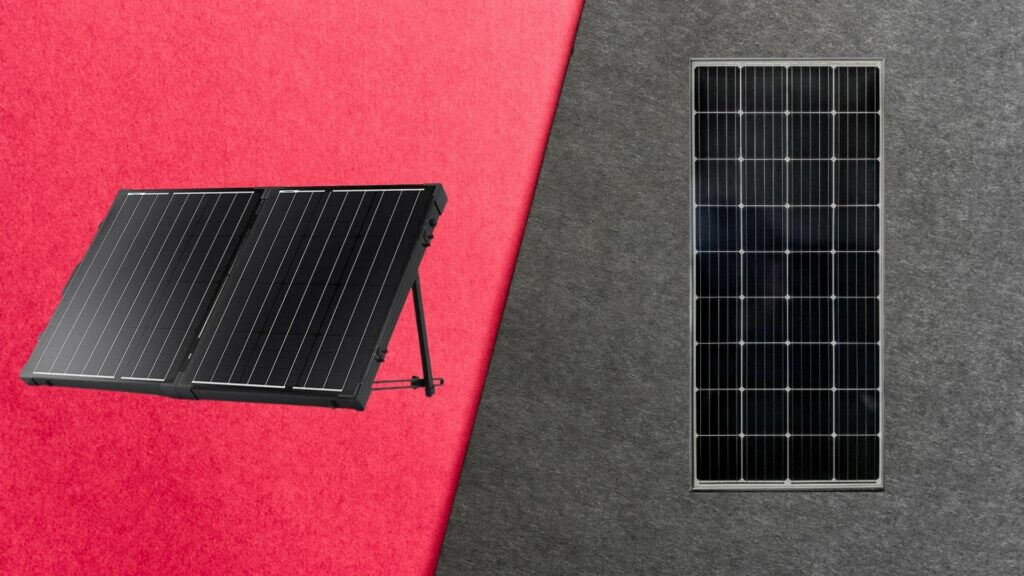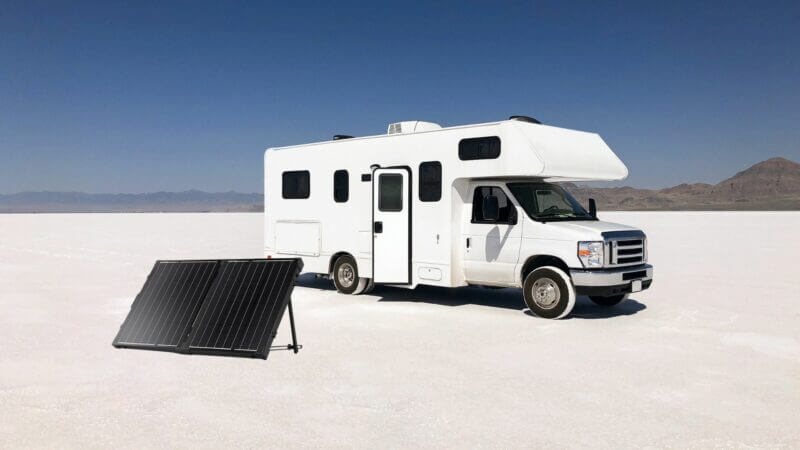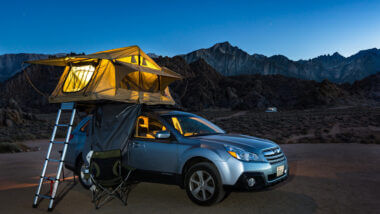Table of Contents Show
RVing is one of the best ways to get out and see the country. You can take all the luxuries of home with you on the road. And things are even better when you’re boondocking, no more crowded, noisy campgrounds. You’ll sometimes be the only person around for miles when you boondock. One thing you need to have for a successful boondocking trip is a power source. That’s where portable solar panels come in.
What are Portable Solar Panels?
Portable solar panels give you an off-grid power source by harnessing the power of the sun. Rather than being affixed to the roof, portable solar panels can be moved around.
These lightweight solar panels can be angled differently depending on where the sun is and how you park. When the sun hits them, they generate power that can charge a battery. Solar panels don’t supply “on-demand” power, which is why you need the battery bank.
There are a few types of portable solar panels available. Some set up on the ground, and others you can hang from the side of your rig. Our favorite is the “suitcase-style” panel, which we’ll talk about later.

Why Choose Portable Panels over Permanent Mounts?
Both permanent roof-mounted solar panels and portable systems have similar costs and effectiveness. But there are several reasons to choose portable panels over mounted panels.
If you use solar panels at home and on the road, a portable system makes the most sense. If you have more than one vehicle you camp out of, the same applies.
So, if you have a van for weekend adventures and an RV for longer trips, portable solar panels would be a great choice. You just need one set of everything and can bring them with you wherever you go.
Portable solar can also be a perfect choice if you’re considering off-grid camping but haven’t gone all out yet. It is an excellent way to test the waters before committing to all the hardware and setup needed for permanent solar panels.
Some other reasons to choose portable over permanent are because of the unique benefits of portable solar panels. We’ll go over those next, so keep reading!
Benefits of Portable Solar Panels
Portability
Portability is excellent when you’re on the road. Portable solar panels are lightweight and easy to move around.
This portability also gives you flexibility in where and how you park. You can park anywhere you want and set your solar panels up nearby in the optimum position for maximum sun.
Ability to park in the shade
Since you can move portable panels anywhere you want, you can park in the shade! This is a tremendous bonus because a rig parked in the sun gets hot fast!
When you are boondocking, conserving energy is a must. So, if you park in the shade, you won’t burn through power with the air conditioner.
If you have a permanent solar setup on your roof, you have to park your rig in the sun for your solar panels to work. But portable panels let you park in the shade while your solar panels stay in the sun.
Ability to store when not in use
If you’re going to be traveling on the grid for a while, you can opt to leave portable panels at home.
This will cut down on weight while driving and help improve your gas mileage at least a little. You won’t have this option if the solar panels are permanently mounted to your RV’s roof.
What to Look for In Portable Solar Panels
There are several things you need to consider when purchasing solar panels. These include cost, quality, energy efficiency, durability, and size.
The ideal solar panels for an RV are cost-effective but high quality. They also should be as lightweight as possible while still being durable. Given all the bumps in the road when RVing, you need something that will last a long time.
The solar panel efficiency rating is also significant. This number impacts how much power they will generate.
You’ll want to find something that has an energy conversion rating of at least 21%-23%. When you power your entire RV on solar power, you may need several panels to get the job done.
Renogy 200 Watt Portable Solar Suitcase
- 【Plug and play solar kit 】complete kit includes a 200W solar suitcase, a 20A waterproof Voyager charge controller,...
- 【Remarkable efficiency】Renogy solar panels using grade A+ monocrystalline solar cells. Advanced smart PWM technology...
Our favorite portable solar panel is the Renogy solar suitcase. It is perfect for RVers for a lot of reasons. First, the suitcase design is absolutely genius. It has a built-in stand you can extend to get the ideal angle. But when you aren’t using it, the panel folds down into a suitcase, complete with a handle. This makes setup and takedown a breeze.
The 200-watt Renogy solar suitcase is also durable. They make the stand of corrosion-resistant aluminum. It also comes with a protective casing suitcase.
The kit includes a 20-amp waterproof charge controller, which makes it ready to go for 12V appliances. The Renogy portable solar panel has a negative-ground charge controller and works with up to 7 different battery types. This means you can use it with almost any battery bank setup. It is an excellent setup for RVs.
What Other People Have to Say
The 200-watt Reongy portable solar panel has many positive reviews and a 4.7/5 star rating on Amazon. Here’s what people have to say about it.
S. Brown from Amazon says, “Been using this now for about a month in my fish house. Batteries never went dead yet, and it charges the batteries very fast. Even on cloudy days, it’s still producing a charge to my batteries.”
And fellow RVer John W Bade from Amazon says, “Relatively compact unit. Works great. Make sure you have a storage area large enough. I keep it behind the driver’s seat in my class C.”
The Renogy is also powerful, despite its small size. The Edison Family had this to say about their recent experience, “We have a pretty small pop-up camper, with a single 88Ah 12v deep cycle battery. Over the course of one night, with the heater on pretty heavily, we used approximately 1/4 of our battery (22 Ah out of 88Ah). This panel charged up those 22AH in under two hours. “
Start Small With A Portable Solar Panel
If you are planning to camp off-grid, solar panels are something you need to invest in. And having a portable solar panel system makes things even more convenient. You can get all the power you need while parking anywhere you want.
Last update on 2024-07-26 / Affiliate links / Images from Amazon Product Advertising API








Well done ! About 4+ years ago I was getting paralysis by analysis trying to build the “perfect” small solar charging system. I finally decided to just jump in with 100W Renogy panel and a simple PWM controller to test the waters. Works very well for us for all the reasons you listed. Since then I have added another 100W panel & small inverter. No holes in my roof, I park in the shade and can follow the sun for max charging.
Great article! Have a question concerning hooking a portable solar panel in. We have almost the exact Battleborn battery set up as you do per your article last year. Soon we will be putting solar panels on the roof adding a transfer switch and Victron MPPT 100/50 controller. My question is will the Renolgy Suitcase just plug into the outlet on the front of our 5th Wheel and we don’t need the controller that comes with the suitcase? Thanks Mick
You will need to use a charge controller. The plug on the front just connects to two wires that connect to the battery.